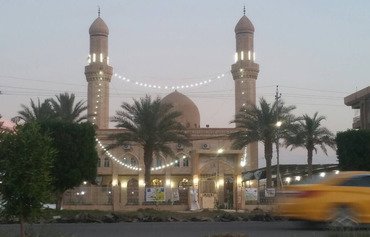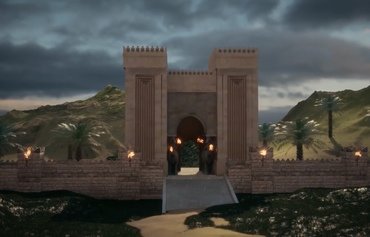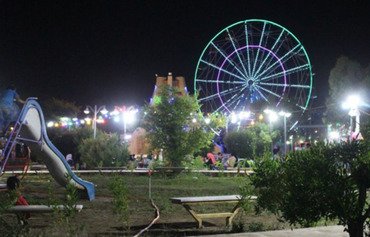After iftar, many Iraqis spend their Ramadan evenings playing the traditional game of al-Muhaibis until the early morning hours.
The "ring game" -- a competition between two teams to find a ring one team member is hiding -- is one of the most popular in Iraq, especially during Ramadan.
As the two teams face each other, the team leader hides a ring in the hand of one of his team members. The other team has to find the ring.
This year, thousands of young people have been gathering in al-Shaab stadium in central Baghdad to participate in the game or to watch it being played.
The games are part of an annual tournament in which 32 teams are competing, organised by the Iraqi Olympic Committee and overseen by al-Kadhimiya team leader Jassim al-Aswad, who is one of the best-known al-Muhaibis players.
Among the competitors are 24 teams from Baghdad neighbourhoods and areas such as al-Kadhimiya, al-Adhamiya and al-Karrada, and eight teams from Karbala, Diyala and Salaheddine provinces.
"The tournament kicked off with the start of Ramadan and will end on June 25th or 26th," al-Aswad told Diyaruna.
Each evening, two games are held between four teams. The winning teams compete with each other until one team is ultimately crowned champion.
A game of luck and skill
Al-Kadhimiya's team has won first place for the last two years, largely due to al-Aswad’s skill at reading his rivals’ faces and pinpointing the hand in which the ring is hidden.
"Our team has a long history of top successes spanning 20 years," he said. "At the same time, there are teams that achieve good results every year, such as the Karbala team."
At every game of the al-Kadhimiya team, the hall is packed with spectators who turn up en masse to watch al-Aswad as he picks out the ring from among hundreds of clenched fists.
Now 66, al-Aswad told Diyaruna he has loved the game since he was a child.
He learned it from his father, who was a "well known player among the people".
The game dates back "hundreds of years, and its place of origin is Baghdad’s old neighbourhoods", al-Aswad noted. Its popularity spread to other parts of the country, and the game is now internationally known.
In addition to being a heritage game that is exciting and fun to play, al-Muhaibis creates "an atmosphere of brotherhood and love" that reflects the spirit of unity among Iraqis, he said.
"It proves we are one people and there is no difference between one sect and another, or one religion and another," he said. "We all play together and cheer together, and we hug each other at the end of each game."
In every round of competition, the sound of drum beats and ululations can be heard, alongside popular patriotic chants.
An atmosphere of friendship and fun
Sadr City team head Ahmed Khanjar told Diyaruna he does not mind whether he wins or loses the game, as "the brotherly atmosphere among the players" is what matters most.
"The game brings together teams from several Iraqi areas and cities, from various sects, religions and ethnicities, which have come to Baghdad to show their love of their country and take part in these moments of joy," he said.
Khanjar said he has been playing al-Muhaibis for 10 years and is currently leading a team of 60 players.
The game's rules stipulate that a winning team must achieve 21 points in order to declare victory – even if the round should last several hours.
As an end-of-game ritual, the two teams and the crowd that has cheered them on enjoy sweets such as Zalabiya and Baklawa, paid for by the losing team.
The most beautiful thing about the game is that it presents an opportunity for rival teams to get to know each other and forge friendships, said Haider Kuraidi, an al-Muhaibis player in al-Karrada's neighbourhood team.
"We love the game because it does not only make us happy, but brings us together with friends and new people," he told Diyaruna.

![Players and spectators enjoy the traditional game of al-Muhaibis at Baghdad's al-Shaab stadium during Ramadan 2016. [Photo courtesy of Jassim al-Aswad]](/cnmi_di/images/2017/06/07/8110-mhabis-ramadan-baghdad-600_384.jpg)






